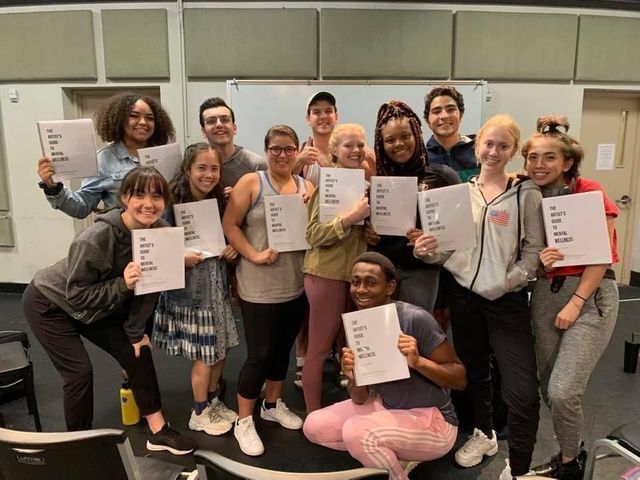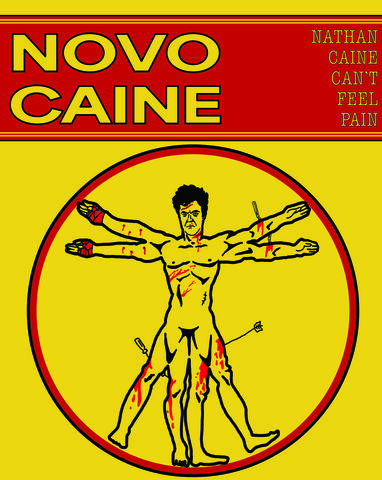In her many years as a performer, musical theater Program Head Kaitlin Hopkins has learned through experience how overwhelming, emotionally taxing and stressful the life of an artist can be. Eight years ago, after witnessing her students seek help for stress-related health issues, she set out to find them a solution.
“We did the research,” Hopkins said. “And we found that if we increase people’s life-skills, if we gave students those tools and taught them how to use those different tools together, then their symptomatology of stress-related disorders went drastically down.”
Teaming up with Dr. Hillary Cauthin, Dr. Marian Houser and Dr. Bill Crawford, Hopkins researched a scientific solution for handling stress and formed Living Mental Wellness, a curriculum focused on preventing stress-related problems before they begin.
“This training is prevention-based,” Hopkins said. “Most healthcare is intervention-based, not prevention-based. We as a society tend to throw pills at things, instead of trying to prevent the problem in the first place.”
The training originally began as a six-week course for musical theater freshmen, who would read through the course and meet weekly to discuss their journeys. For many of the students, like Kaitlin O’Leary, a musical theater sophomore, the course provided mental health knowledge she had never been taught in high school.
“I still have my book with me that Kaitlin gave us freshman year, and honestly, I do go back through it often,” O’Leary said. “It talks a lot about the science of how your brain processes information, so it’s always nice to go back and read exactly what is happening to you, so you don’t feel like it’s out of your control; it’s just how your body literally processes it.”
Hopkins says depending on the person, stress can manifest itself in the body in different ways. She has seen some students get sick, others break out in a rash or even turn to alcohol and drugs to block out the stress.
“You can think about stress as filling up a trash can,” Hopkins said. “You have to learn how to empty that stress so that you don’t get to the point where it’s so full that your body just breaks down. You have to clear out that stress so you don’t max out.”
She found teaching life skills, such as breathing exercises, communication tools and time-management, helped clear stress. Caleb Peters, a musical theater senior, still uses the time management skills he learned in Hopkins’ workshop to remain calm and see his work from a more manageable viewpoint.
“For me, it helped with taking a step back,” Peters said. “Instead of looking at all the things I had to do and thinking about how they all have to get done, I was able to look at it from a birds-eye view. That was big for me.”
With more time to manage than ever before as students fight sickness, fatigue and the stressors of online school, Hopkins looked for a way to bring resources to as many students as possible. Utilizing unused research funds, her team provided free online access to the curriculum this school year for all students in the Department of Theater and Dance.
“We’re now in a moment in our world where people need mental wellness tools more than ever,” Hopkins said. “Everybody’s mental health is just tanking because of the need for connection.”
Because of the program’s new accessibility, Marisa Mendoza, an acting junior, immediately began the fall semester with the online course, where she learned more about creating goals, stress management and breathing exercises. This was the first semester the curriculum was offered to non-musical theater majors, and Mendoza believes the curriculum will bring the department together.
“I think it will be really nice for the [Department of Theater and Dance] population as a whole,” Mendoza said. “It will get us all on the same page and using the same language around mental health.”
Eight years ago, Hopkins may not have imagined her program touching so many students, and yet, the Living Mental Wellness curriculum has been taught to students, educators, working professionals and in other countries.
With finals on the horizon and stress building up among Bobcats in every department, students like O’Leary hold on to the lessons she learned in the curriculum to survive the rest of the semester.
“The biggest thing I learned was that you can’t control what happens to you,” O’Leary said. “But you can control how you respond to it.”
For more information about the Living Mental Wellness curriculum and program visit its website.
Categories:
Musical theater program head offers students free mental wellness course
Payton Russell, Life and Arts Contributor
November 30, 2020
Musical theater program head Kaitlin Hopkins speaks at a TEDx conference July 21, 2016 in Fargo, North Dakota. Hopkins spoke to her artistic perspective on the importance of teaching mental health in schools.
0
Donate to The University Star
Your donation will support the student journalists of Texas State University. Your contribution will allow us to purchase equipment and cover our annual website hosting costs.
More to Discover










